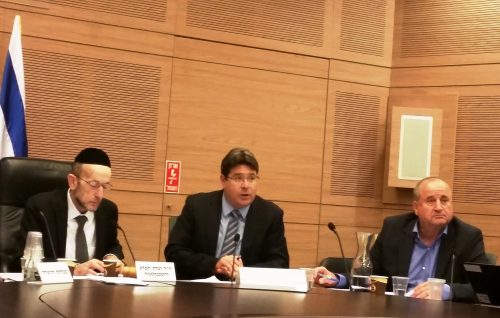Minister Akunis presented the ministry's activities to the members of the Knesset's Science Committee. The chairman of the committee, MK Uri Makalev: "Enshrined in law the National Science Day"

The Science and Technology Committee met today (Monday) to present the main activities of the Ministry of Science by the Minister of Science, Technology and Space, MK Ofir Akunis.
The chairman of the committee MK Uri Makleb (Torah Judaism) opened by saying that "the committee was exposed to a lot of activity of the ministry, the issue of space is a central part of the security of the State of Israel, and this is the opportunity to expand more on the activities of the ministry."
At the beginning of his remarks, the minister referred to the manpower in the high-tech market in Israel: the goal of the ministry is that Israel will continue to lead as a high-tech powerhouse, by investing millions in the next generation of high-tech industries." Akunis stated that he is required to import engineers from abroad, but he is strongly against this: "We must not get into a situation where we import engineers from abroad. Contrary to other predictions, the Israeli high-tech market is strong, stable and healthy. There is competition with other countries in the world, but it is a healthy competition. Israel is a leader in innovation and all over the world we are looked at with amazement and appreciation. Our investments today are the basis for the industry and continued success."
The minister reviewed the ministry's activities, with the main emphasis for 2016 being encouraging excellence and increasing access to science and technology among youth, high school students and among students with an emphasis on the periphery in the fields of science and technology. Also promoting favored populations in science and technology: "We strengthen the Arab population and other populations mainly in the periphery".
The minister noted that the ministry provides ongoing support to the research and development centers in the periphery, scattered from Kiryat Shmona in the north to the Arava in the south, and will provide broader support, including in the budgetary aspect.
The minister detailed the main activities carried out in the first half of 2016, with the highlight being the transition to the "Science Basket" program, a program that he said would "support local authorities to encourage activities and events in the fields of science, technology, cyber, robotics and space. The program is designed to expand and deepen the activity in these areas for the general public, especially for children and teenagers, and it is good news for many populations."
Other key activities of the office are: expanding the future female scientists project, expanding the 2016 scientific summer activity, supporting research centers and funding youth and student delegations to science and innovation competitions abroad.
During the debate MK Makleb called on the Minister to enshrine the National Science Day in legislation, Akunis replied that this is a welcome initiative.
Makleb also called on the minister to "strengthen the position of the scientists and regulate the position of the chief scientist in the Ministry of Science", Akunis replied that "the procedure is at an advanced stage and will be completed within days, the importance of the chief scientists is clear to everyone and we will continue to strengthen them".
Another activity is under the Lahava project - a project to reduce the digital gap in Israeli society, this project came to the ministry a year and a half ago from the Ministry of Finance: "In a new tender that is being held, we will work to increase the budget of the project, which currently stands at about thirty million shekels."
The minister also noted that "in recent months, the ministry has been promoting a new program on biomedical imaging with the province of Quebec in Canada and a new research program with Germany for electrochemistry research. A new agreement is expected to be signed soon with Ethiopia to promote scientific cooperation between the two countries. An important agreement was signed this year with the Institute for Stem Cell Research in California CIRM. In addition, the ministry encourages the holding of international scientific conferences in Israel and participates in their financing. Joint activity is also done with China, Germany, France and other countries. The existence of these activities indicates that there is no boycott of Israel, and that the various countries know that it pays for them to cooperate with Israel."
MK Prof. Manuel Trachtenberg noted that "the Ministry of Science has made great progress in recent years, this progress is not marginal because the size of the Ministry is relatively small and could very easily be pushed aside in the budget. Nevertheless, wise moves were made to find the niches in which it is possible to operate."
Alongside this, Trachtenberg noted that "there is an acute need to strengthen applied research in Israel. I call on the Minister of Science to strengthen centers like Miguel and link with other institutions like the Safed Medical School and Tel Hai College. The State of Israel also longs for engineers and a range of professions that could be studied in colleges. That's why I want to submit a bill to establish a council for technological education, and call on the minister to mobilize."
The chairman of the committee concluded the discussion: "We welcome what has been done, and we have done quite a bit, along with that we will continue to follow the developments and other activities on the issues that require treatment that have been brought up here, in order to preserve Israel's position in these highly thought-provoking areas."
